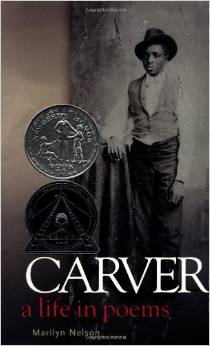Carver: A Life in Poems facts for kids
 |
|
| Author | Marilyn Nelson |
|---|---|
| Country | United States |
| Language | English |
| Genre | Novel |
| Publisher | Front Street, an imprint of Boyds Mills Press |
|
Publication date
|
1997 |
| Media type | |
| Pages | 103 pp |
Carver: A Life in Poems is a special book from 1997. It's a collection of poems by American poet Marilyn Nelson. The poems tell the amazing story of George Washington Carver's life.
Contents
Discovering George Washington Carver's Life
George Washington Carver was a famous American inventor and teacher. He was born around 1864 in Missouri. His early life was very difficult. He was raised by a white couple who cared for him. This book shares Carver's life story through poems. These poems are written as if by people who knew him. They include his friends and family.
The book was first published on April 23, 1997. It quickly became very popular. It even won the prestigious John Newbery Medal. This award is given to the most outstanding American children's book.
About the Author: Marilyn Nelson
The author of this wonderful book is Marilyn Nelson. She is an award-winning American writer. Marilyn Nelson was born on April 26, 1946, in Cleveland, Ohio. She started writing poems when she was in elementary school. Later, she studied at the University of Minnesota and the University of Pennsylvania.
Poems That Tell a Story
Carver: A Life in Poems shares different parts of George Washington Carver's life. Each poem is like a snapshot of his journey. They are often told from the viewpoint of people who met him.
- "Out of 'Slave's Ransom'" (Written by John Bentley): This poem describes a difficult time. Moses Carver loses Mary, a young woman, and her son. He asks John Bentley to help find them. Bentley eventually finds Mary and her son in Arkansas. He then brings them back to Mrs. Carver.
- "Prayer of the Ivory-Handed Knife" (Written by Susan Carver): Susan Carver receives two orphans, Jim and George. At first, she worries they might feel like strangers. But as she gets to know them, she feels very thankful to have them in her life.
- "Watkins Laundry and Apothecary" (Written by Mariah Watkins): Mariah takes in a ten-year-old boy. He attends her school for Black children. He arrives with almost nothing. But he is kind to other children. He even teaches girls how to crochet. As he grows, he leaves to find a teacher who can teach him even more.
- "Drifter": This is a short poem with a deeper meaning. It asks questions about nature. For example, "why rain falls" and "what makes corn proud."
- "The Perceiving Self" (Written in Fort Scott, Kansas): This poem gives a detailed description of George Carver. It talks about his voice and how he speaks.
- "Washboard Wizard" (Written in Highland, Kansas 1885): This poem shows Carver's amazing talent. He is very skilled at using a washboard. People call him the "Washboard Wizard." Even though he lives simply, he is known as "the best wash woman in town." He is also very smart and offered a college scholarship.
- "Old Settlers’ Reunion" (Written in Ness County, Kansas): The narrator meets Carver at a reunion. Carver is described as a quiet person. But during their time together, Carver is always joyful and humble.
- “A Ship Without a Rudder” (Written by Helen Milholland): This poem is about Helen falling in love. She meets John at church and they fall in love. Helen feels sure about marrying him.
- “The Prayer of Miss Budd” (Written in Simpson College, Iowa, 1890): A college professor, Miss Budd, prays about a student. The student is a talented artist but struggles financially. The professor prays for the ability to guide this gifted painter.
- “The Last Rose of Summer”: This poem describes how simple things lose meaning. Jim, the narrator's brother, gets smallpox. Suddenly, piano lessons and a rose become unimportant.
Awards and Recognition
Carver: A Life in Poems was recognized as a Newbery Medal Honor Book in 2002. This means it was one of the top books considered for the Newbery Medal that year.
 | Georgia Louise Harris Brown |
 | Julian Abele |
 | Norma Merrick Sklarek |
 | William Sidney Pittman |

